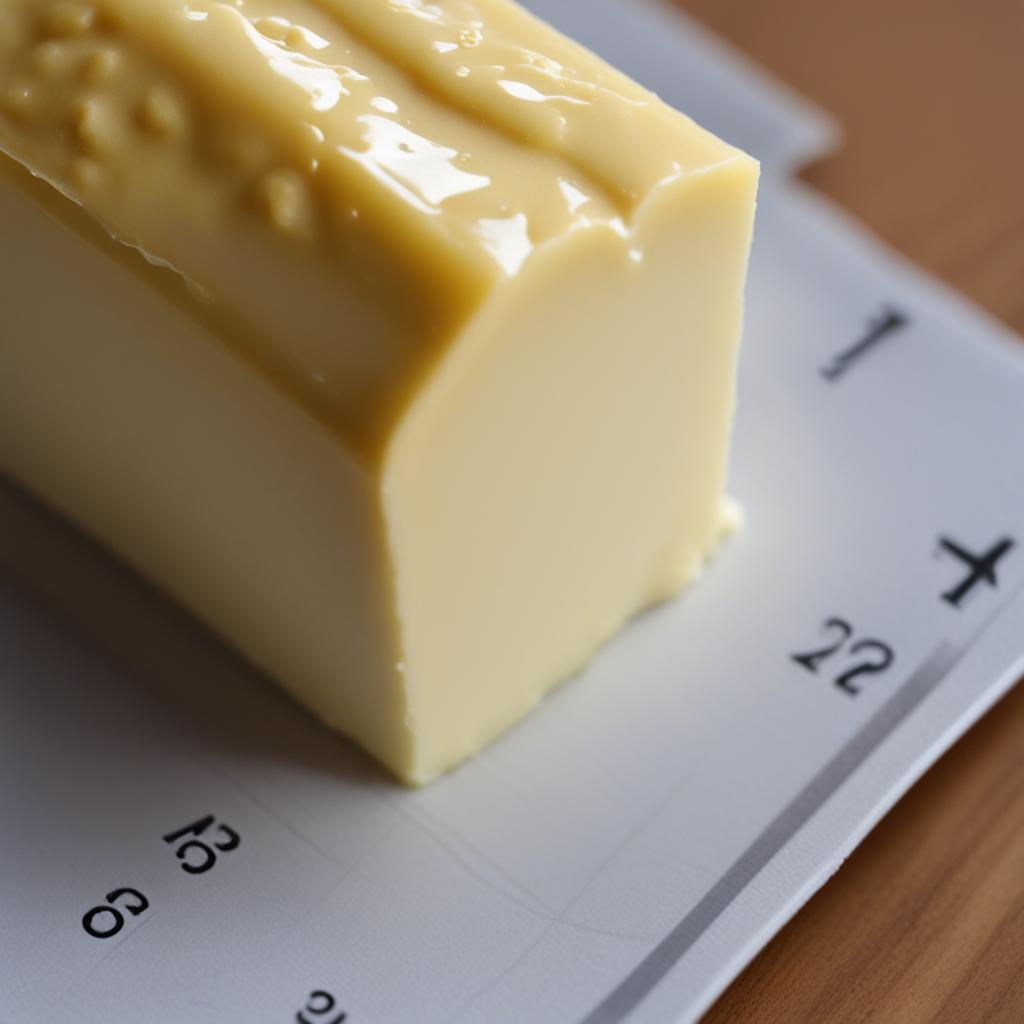Greetings, butter lovers! Today, I’m here to answer a burning question: Can you eat expired butter? We all know that butter is a staple in many households, but understanding its shelf life and proper storage is crucial for food safety and enjoyment. So, let’s dive into the fascinating world of expired butter and uncover all the important facts.
Key Takeaways:
- Butter does expire, but its shelf life depends on storage and handling.
- Checking the expiration date is a good starting point to determine the freshness of butter.
- Refrigerated butter can last from a month to a year if stored properly.
- Expired butter may not cause food poisoning but can lead to discomfort or a minor stomach ache.
- Proper storage techniques, such as using airtight containers and keeping butter away from heat and light, can help prevent spoilage.
How Long Does Butter Last?
When it comes to the shelf life of butter, various factors can influence its expiration date. Refrigerated butter, if tightly wrapped, can last for one to three months. On the other hand, frozen butter can be stored for up to a year. However, if you prefer to store butter on the counter for easier spreading, it should be consumed within a day or two to avoid the risk of it turning rancid.
One important factor to consider is whether the butter is salted or unsalted. Salted butter tends to have a longer shelf life due to the preservative properties of salt. Regardless of which type you have, it is crucial to check for any signs of spoilage, such as a sour smell or noticeable discoloration, before using the butter.
To summarize:
- Refrigerated butter can last for one to three months when tightly wrapped.
- Frozen butter can be stored for up to a year.
- Butter stored on the counter should be consumed within a day or two.
- Salted butter has a longer shelf life compared to unsalted butter.
“The expiration of butter depends on the storage method.”
How to Determine if Butter Has Gone Bad
When it comes to determining if butter has gone bad, there are a few signs to look out for. One of the most noticeable indicators is a sour smell. If your butter emits an unpleasant odor that is different from its usual creamy aroma, it is likely spoiled. Another sign to watch for is discoloration. If you notice any unusual colors, such as green or gray, it is a strong indication that the butter is no longer safe to consume. Additionally, the presence of mold on the surface of the butter is a clear sign of spoilage.
“Spoiled butter can be easily identified by its sour smell, noticeable discoloration, or the presence of mold.”
To ensure that your butter is still good, Venae Watts, a butter maker, recommends a two-step test. First, visually inspect the butter for any signs of expiration. Then, taste a small amount to check for any off flavors. If you detect any signs of spoilage in either the visual or taste test, it is best to discard the butter to avoid any potential foodborne illnesses.
It is important to note that while some people may be more sensitive to the taste and smell of spoiled butter, it is always better to err on the side of caution and discard any butter that shows signs of expiration. It is not worth the risk to consume butter that has gone bad, as it may cause stomach discomfort and potential vitamin depletion.
| Signs of Spoiled Butter | Actions to Take |
|---|---|
| Sour or unpleasant odor | Discard the butter |
| Unusual discoloration (green, gray, etc.) | Discard the butter |
| Presence of mold | Discard the butter |
| Off flavors | Discard the butter |
Is It Safe to Use Expired Butter?
When it comes to using expired butter, safety is always a concern. While it is generally safe to consume expired butter as long as there are no visible signs of spoilage, it is important to exercise caution and follow proper food handling practices. Conducting a senses test can help determine if the butter is still suitable for consumption.
Using expired butter is safe as long as it does not show any signs of spoilage such as a sour smell, noticeable discoloration, or the presence of mold. The United States Department of Agriculture (USDA) states that even if the expiration date has passed, the product should still be safe, wholesome, and of good quality if handled properly and kept refrigerated. However, it is recommended to conduct a senses test to ensure the butter is still fresh.
The senses test involves visually inspecting the butter for any signs of expiration and then tasting a small amount. If the butter appears normal and tastes fine, without any off-putting flavors, it can be considered safe to use. However, if there are any signs of spoilage, it is best to err on the side of caution and discard the expired butter to avoid any potential health risks.
| Using Expired Butter Safely | Not Using Expired Butter |
|---|---|
| – Conduct a senses test – Look for signs of spoilage – If it appears and tastes fine, it is safe to use |
– Visible signs of spoilage – Sour smell – Noticeable discoloration – Presence of mold |
How Long Can Butter Be Used After the Expiration Date?
When it comes to the shelf life of butter, it’s important to consider whether it’s unopened or opened. Unopened butter stored in the refrigerator can last up to a month past the printed expiration date. On the other hand, opened butter should be used within two weeks to ensure its freshness and quality. These timeframes may vary depending on storage conditions and the brand of butter.
To provide a clearer picture, let’s take a look at the table below:
| Type of Butter | Storage | Duration After Expiration Date |
|---|---|---|
| Unopened Butter | Refrigerator | Up to a month |
| Opened Butter | – | Up to two weeks |
Remember, it’s always important to check for any signs of expiration before using stored butter. If there is visible mold, a sour smell, or significant discoloration, it’s best to discard the butter to avoid any potential health risks.
Proper Butter Storage Methods
When it comes to ensuring the longevity of your butter, proper storage is key. Here are some methods to help you store your butter effectively:
Refrigerator
The refrigerator is the most common and convenient storage option for butter. Make sure to store it in an airtight container or wrap it tightly in aluminum foil or wax paper to prevent it from absorbing odors or losing moisture. Storing butter in the inner shelves of the refrigerator helps maintain a consistent temperature, preventing it from becoming too soft or melting.
Freezer
If you want to store butter for an extended period, the freezer is your best bet. Before freezing, ensure that the butter is well-wrapped to prevent freezer burn. You can either wrap it tightly in plastic wrap or place it in a resealable freezer bag. Frozen butter can last up to a year, maintaining its quality and flavor.
Counter
If you prefer soft butter for spreading or baking, you can store it on the counter. However, it’s essential to note that butter left at room temperature can spoil faster than refrigerated or frozen butter. To prevent spoilage, only store small amounts of butter on the counter and use it within a day or two.
Salted vs. Unsalted Butter
There is a slight difference in shelf life between salted and unsalted butter. Salt acts as a preservative and helps extend the shelf life of butter. Salted butter can last slightly longer than unsalted butter, but both varieties should be stored using the same methods mentioned above.
By following these proper storage methods, you can ensure that your butter remains fresh, flavorful, and safe to use.
| Storage Method | Shelf Life |
|---|---|
| Refrigerator | One to three months |
| Freezer | Up to one year |
| Counter | Within a day or two |
What Happens When You Eat Expired Butter?
Eating expired butter may result in discomfort and, at worst, a minor stomach ache. Moldy butter can be dangerous to consume, but it takes a long time for butter stored in the refrigerator to grow mold. Rancid butter can lead to a depletion of vitamin E and vitamin B stores. However, expired butter will not cause food poisoning or pose a severe health risk.
Effects of Eating Expired Butter
When you consume expired butter, you may experience a minor stomach ache due to the breakdown of fat and the presence of harmful bacteria. Moldy butter can contain mycotoxins, which can cause digestive issues and allergic reactions in some individuals. However, it is crucial to note that mold growth is rare in refrigerated butter due to its low moisture content.
“While eating expired butter may not have immediate severe consequences, it is always best to err on the side of caution and discard any butter that has passed its expiration date.”
Vitamin depletion is another concern when eating expired butter. Over time, exposure to heat, light, and oxygen can cause the butter’s fat to oxidize, leading to a decrease in vitamin E content. Additionally, the breakdown of fat can also result in a loss of vitamin B stores. However, the impact of consuming expired butter on overall nutrition is relatively minimal.
Proper Storage and Consumption
To ensure the safety of butter consumption, it is essential to follow proper storage practices. Keeping butter refrigerated below 40 degrees Fahrenheit helps slow down the breakdown process and reduce the risk of spoilage. Regularly inspect the butter for any signs of expiration, such as a sour smell or noticeable discoloration, before using it.
If you are uncertain about the quality of expired butter, conducting a senses test can provide valuable information. Simply smell a small amount of butter to check for any off-putting odors. Additionally, tasting a small portion can help identify any unusual flavors that may indicate spoilage. Trust your senses and use your judgment to determine if the butter is still suitable for consumption.
While eating expired butter may not lead to severe health consequences, it is always best to prioritize food safety. Proper storage, frequent checks for signs of spoilage, and responsible consumption practices can help ensure the freshness and quality of butter for a satisfying culinary experience.
The Safety of Using Old Butter
When it comes to using old butter, safety is of the utmost importance. While butter can be safely consumed past its expiration date, it is crucial to inspect it before use. Old butter may be prone to bacterial growth and mold, which can pose health risks if consumed. To ensure the safety of your butter, it is essential to practice proper storage techniques and regularly check for any signs of spoilage.
Bacterial growth is one of the main concerns when using old butter. As butter ages, it becomes more susceptible to the growth of harmful bacteria, especially if it is not stored properly. When bacteria multiply in butter, it can lead to foodborne illnesses and digestive issues. Inspect the butter for any unusual smells, discoloration, or visible signs of mold before considering its use.
To prevent bacterial growth and mold formation, store your butter in airtight containers in a cool and dry place. The ideal storage temperature for butter is below 40 degrees Fahrenheit. Additionally, avoid exposing butter to direct sunlight and temperature fluctuations, as this can accelerate spoilage. Regularly check the expiration dates and inspect the butter for any signs of spoilage, such as an off smell or unusual texture.
| Signs of Spoiled Butter | Preventive Measures |
|---|---|
| Unusual smell | Store butter in airtight containers |
| Discoloration | Keep butter in a cool and dry place |
| Visible mold | Avoid exposing butter to sunlight |
“It’s important to remember that if your butter shows any signs of expiration or mold, it is best to discard it to ensure your health and safety,”
says certified food safety expert Karen Smith.
By following these safety measures and being vigilant about the quality of your butter, you can enjoy its rich flavor and creamy texture while minimizing the risk of consuming spoiled butter. Remember, when in doubt, it’s always better to err on the side of caution and opt for fresh butter.

Expert Tip: The Butter Test
“When testing old butter, a simple sensory evaluation can help determine if it is still safe to consume,”
advises renowned chef and food critic James Thompson.
“Start by smelling the butter. If it has a rancid or sour odor, it is a clear indication that it has gone bad. Next, perform a small taste test. If the butter tastes off or has a strange aftertaste, it’s best to discard it.”
By conducting these simple tests, you can ensure your butter is safe and enjoy its deliciousness without compromising your health. Remember, old butter doesn’t necessarily mean unsafe butter, but it’s essential to remain cautious and trust your senses when determining its usability.
Can Butter Be Consumed After the “Best Before” Date?
When it comes to butter, many wonder if it can still be consumed after the “best before” date has passed. The answer is yes, butter can still be eaten after its “best before” date, as long as it has been stored properly. While the date provides guidance on when the butter is at its peak freshness, it doesn’t necessarily mean that the butter is unsafe to eat afterward. However, there are a few things to consider before consuming butter past its recommended date.
Firstly, it is important to ensure that the butter has been stored below 40 degrees Fahrenheit (4 degrees Celsius). Proper storage temperature helps to increase the shelf life of butter. Discoloration, a sour smell, and changes in taste are indicators that the butter is no longer safe to eat. If any of these signs are present, it’s best to discard the butter to avoid any potential risks.
It’s also crucial to note that the “best before” date is different from the expiration date. The “best before” date refers to the period during which the butter is expected to retain its optimal quality, such as taste and texture. However, the butter can still be consumed safely after this date, as long as it has not shown any signs of spoilage.
| Expiration Date | Butter Consumption Guidelines |
|---|---|
| Before “Best Before” Date | Butter is at its peak freshness and quality |
| After “Best Before” Date | Butter can still be consumed if stored properly and shows no signs of spoilage |
It’s important to use your best judgment and rely on your senses when deciding whether to consume butter after the “best before” date. When in doubt, it’s always safer to discard the butter rather than risking potential foodborne illnesses.
How to Store Butter for Extended Shelf Life
Proper storage is key to extending the shelf life of butter and ensuring its freshness. Whether you prefer refrigerating, freezing, or storing butter at room temperature, there are certain guidelines to follow to maximize its longevity.
Refrigerator Storage
Storing butter in the refrigerator is a popular choice for many households. To store butter in the refrigerator, follow these steps:
- Keep butter tightly wrapped in its original packaging or in an airtight container to prevent it from absorbing odors and flavors from other foods.
- Store butter in the inner shelves of the refrigerator, away from the door, where temperature fluctuations are minimal.
- Make sure the temperature of your refrigerator is set to around 40 degrees Fahrenheit or below. This helps slow down the breakdown of butter’s fat, preserving its quality.
- Regularly check for any signs of spoilage, such as discoloration or a sour smell, before using refrigerated butter.
Freezer Storage
If you’re looking to extend the shelf life of butter even further, storing it in the freezer is a great option. Here’s how to store butter in the freezer:
- Wrap the butter tightly in aluminum foil, plastic wrap, or place it in a freezer-safe container to protect it from freezer burn.
- Label the wrapped butter with the date of freezing to keep track of its freshness.
- Store butter in the coldest part of your freezer, ideally at or below 0 degrees Fahrenheit.
- When you’re ready to use frozen butter, thaw it in the refrigerator overnight to ensure a gradual thawing process.
Room Temperature Storage
If you prefer to keep butter soft and easily spreadable, storing it at room temperature is an option. However, keep in mind that butter stored at room temperature has a shorter shelf life compared to refrigerated or frozen butter. Here’s how to store butter at room temperature:
- Keep butter in an airtight butter dish or a covered butter crock to protect it from light, heat, and odors.
- Store butter away from direct sunlight and heat sources, such as stovetops or ovens.
- Use room temperature butter within a week to ensure its freshness and quality.
By following these storage methods, you can extend the shelf life of your butter and enjoy its creamy goodness for a longer period. Whether it’s refrigerating, freezing, or storing at room temperature, proper storage practices are essential to maintain the freshness and quality of butter.
| Storage Method | Recommended Temperature | Shelf Life |
|---|---|---|
| Refrigerator | Around 40 degrees Fahrenheit or below | 1-3 months |
| Freezer | 0 degrees Fahrenheit or below | 6-9 months |
| Room Temperature | 70-75 degrees Fahrenheit | Up to 1 week |
The Importance of Smell and Taste Tests
When it comes to determining spoiled butter, sensory evaluation through smell and taste tests plays a critical role. These simple yet effective tests can help identify any signs of spoilage and ensure the butter is safe for consumption.
The first step is to use your sense of smell. If the butter has a sour or unpleasant odor, it is likely that it has gone bad. A strong, rancid smell is a clear indicator that the butter should be discarded. Trusting your sense of smell is essential in distinguishing between fresh and spoiled butter.
Next, you can conduct a taste test. Take a small amount of the butter and taste it. If the butter has an off-putting or unpleasant flavor, it is best to avoid consuming it. Fresh butter should have a mild, creamy taste, while spoiled butter may have a bitter or sour taste.
Remember, when conducting these tests, it is important to trust your senses. If the butter smells bad or tastes off, it is better to be safe than sorry and discard it.
Example of Smell and Taste Test Table
| Test | Result |
|---|---|
| Smell Test | Sour, rancid odor |
| Taste Test | Off-putting or unpleasant flavor |
By regularly conducting smell and taste tests, you can ensure that the butter you use is fresh and safe for consumption. These simple tests are an effective way to determine if the butter has gone bad and help prevent any potential health risks.
Factors Affecting Butter Expiration
When it comes to the expiration of butter, several factors come into play. The way butter is stored and exposed to certain elements can significantly impact its shelf life. Let’s explore the key factors that affect the expiration of butter:
- Heat: Excessive heat can accelerate the breakdown of fat in butter, leading to spoilage. It’s important to store butter in a cool environment, such as the refrigerator or freezer, to extend its shelf life.
- Light: Exposure to light can also contribute to the degradation of butter. To prevent this, keep butter in an opaque container or wrap it in foil or parchment paper to shield it from direct light.
- Oxygen: Butter’s exposure to oxygen can cause it to turn rancid more quickly. Properly sealing the packaging and storing butter in airtight containers can help minimize its contact with oxygen.
- Fat Breakdown: Butter contains milk solids, which can break down over time and lead to spoilage. The breakdown of fat in butter results in off-putting flavors and a decrease in quality. Storing butter in colder temperatures can slow down this process and prolong its freshness.
By considering these factors and implementing proper storage practices, you can maximize the shelf life of your butter and ensure its quality.
Table: Factors Affecting Butter Expiration
| Factor | Effect |
|---|---|
| Heat | Accelerates fat breakdown and spoilage |
| Light | Contributes to degradation of butter |
| Oxygen | Causes butter to turn rancid more quickly |
| Fat Breakdown | Results in off-putting flavors and decreased quality |
Understanding and managing these expiration factors can help you preserve the freshness of your butter and ensure its enjoyment in various culinary applications.
Butter Shelf Life Compared to Other Dairy Products
When it comes to dairy products, each has its own shelf life and susceptibility to spoilage. Butter, despite its delicious flavor and versatility, has a relatively shorter shelf life compared to some other dairy products, such as milk and margarine.
In terms of shelf life, butter generally lasts up to a year when properly stored. However, it is important to note that the shelf life of butter can vary based on storage conditions and exposure to heat, light, and oxygen. These factors can accelerate the breakdown of the butter’s fat, leading to spoilage.
Dairy Product Shelf Life
Let’s compare the shelf life of butter with other commonly used dairy products:
| Dairy Product | Shelf Life |
|---|---|
| Milk | 7-10 days |
| Butter | Up to 1 year |
| Margarine | Several months to 1 year |
As seen in the table above, butter outlasts milk in terms of shelf life. While milk typically lasts for about 7-10 days, butter can remain usable for up to a year if stored correctly.
Margarine, a popular butter alternative, also has an expiration date, but its composition enables it to last longer than butter. However, it is worth noting that proper storage and handling practices are essential for maximizing the shelf life of all dairy products.
In conclusion, while butter has a relatively shorter shelf life compared to some other dairy products, it can still be enjoyed for an extended period if stored properly. By understanding the factors that contribute to butter spoilage and implementing appropriate storage measures, you can ensure the freshness and safety of your butter for as long as possible.
Preventive Measures for Butter Spoilage
When it comes to preventing butter spoilage, proper storage is key. By following a few simple steps, you can ensure that your butter stays fresh and delicious for longer. Here are some preventive measures to consider:
- Use airtight containers: To protect your butter from exposure to air and moisture, store it in airtight containers. This will help prevent the butter from absorbing any unwanted odors or flavors from the surrounding environment.
- Control the temperature: Butter should be stored at a consistent and cool temperature to maintain its freshness. Keep it away from heat sources, such as stoves or direct sunlight, which can cause the butter to soften or even melt.
- Choose the right storage location: Find a suitable spot in your kitchen for storing butter. It’s best to keep it in the inner shelves of the refrigerator, away from temperature fluctuations. This will help maintain its quality and prevent spoilage.
By implementing these preventive measures, you can significantly extend the shelf life of your butter and minimize the risk of spoilage. It’s important to regularly check for any signs of expiration, such as discoloration or an off-putting smell, and discard any butter that has gone bad.
Remember, proper storage and handling practices are essential for preserving the freshness and taste of your butter. By taking the necessary precautions, you can enjoy your butter for longer periods, ensuring its quality in various culinary applications.
| Preventive Measures for Butter Spoilage |
|---|
| Use airtight containers |
| Control the temperature |
| Choose the right storage location |
Butter’s Versatility and Culinary Uses
Butter is a staple in the kitchen and is known for its versatility in various culinary applications. From cooking to baking and spreading, butter adds flavor, richness, and a creamy texture to a wide range of dishes. Let’s explore some of the popular culinary uses of butter and discover a few kitchen hacks along the way.
Cooking with Butter
Butter is often used in cooking to enhance the flavors of savory dishes. It adds richness and a smooth consistency to sauces, gravies, and sautéed vegetables. When frying or pan-searing, adding a pat of butter can provide a delicious taste and help develop a golden brown crust on meats or vegetables. Butter can also be used to baste meats while roasting, resulting in a flavorful and juicy final product.
Baking with Butter
In baking, butter plays a crucial role in creating tender and moist baked goods. It adds flavor and richness to cookies, cakes, pastries, and bread. Butter is often creamed with sugar to create a light and fluffy texture in cakes and cookies. It can also be melted and incorporated into batters or doughs to add moisture and enhance the overall taste. From flaky pie crusts to gooey brownies, butter is a key ingredient in creating delicious baked treats.
Spreading and Other Kitchen Hacks
Aside from cooking and baking, butter is commonly used as a spread on bread, toast, and bagels. It adds a creamy and indulgent element to breakfast and snack items. Butter can also be used as a simple and flavorful topping for steamed vegetables, grilled corn on the cob, or a stack of fluffy pancakes.
Moreover, butter can be a useful ingredient in various kitchen hacks. From preventing sticky rice by adding a pat of butter to the cooking water, to using a bit of butter to loosen sticky residue on kitchen tools, this versatile ingredient has numerous practical applications in the culinary world.

“Butter adds flavor, richness, and a creamy texture to a wide range of dishes.”
Conclusion
In conclusion, it is important to be aware of butter’s expiration and practice proper storage techniques to ensure food safety. While butter does expire, its shelf life can be extended by storing it in the freezer or refrigerator. When stored correctly, expired butter is generally safe to eat as long as there are no signs of spoilage, such as a sour smell or mold.
To determine if butter is still suitable for consumption, conducting sensory evaluations, such as smelling and tasting a small amount, can provide valuable information about its freshness. Remember to discard any butter that shows signs of expiration or mold.
By following storage tips and preventive measures, you can enjoy butter while maintaining its quality. Store butter in airtight containers, away from heat sources and light, and check for signs of spoilage regularly. Understanding butter’s shelf life and implementing these practices will help ensure the safety of your food.
FAQ
Can you eat expired butter?
While it is generally safe to eat expired butter if there are no signs of spoilage, it is important to conduct sensory evaluations and follow proper storage practices.
How long does butter last?
Refrigerated butter can last for one to three months, while frozen butter can last up to a year. Butter stored on the counter should be used within a day or two to prevent spoilage.
How to determine if butter has gone bad?
Spoiled butter can be identified by its sour smell, noticeable discoloration, or the presence of mold.
Is it safe to use expired butter?
Unless there are visible signs of expiration or a sour smell, it is generally safe to use expired butter. Conducting a senses test can help determine if the butter is still suitable for consumption.
How long can butter be used after the expiration date?
Unopened refrigerated butter can last up to a month past the printed date, while opened butter can last up to two weeks. Unopened butter stored in the freezer can last from nine months to a year past the date.
What are proper butter storage methods?
Butter can be stored in the refrigerator, freezer, or on the counter, depending on the desired shelf life. Storing butter in the freezer offers the longest shelf life, while the counter is suitable for short-term storage.
What happens when you eat expired butter?
Eating expired butter may result in discomfort and, at worst, a minor stomach ache. However, expired butter will not cause food poisoning or pose a severe health risk.
Is it safe to consume old butter?
While old butter can be safely consumed, it is important to inspect it before use. Spoiled butter may have bacterial growth or mold, which can lead to health risks.
Can butter be consumed after the “best before” date?
Butter can be consumed after the “best before” date. While it is safe to use butter a week after the expiry date at room temperature, correct storage is essential.
How to store butter for extended shelf life?
Butter can be stored in the freezer, refrigerator, or at room temperature. Storing butter in the freezer can extend its shelf life, while refrigerated butter can last for a month past the printed date.
What are the importance of smell and taste tests?
Smell and taste tests are vital to determine if butter has gone bad. A sour smell and noticeable discoloration are signs of spoilage. Tasting a small amount can also help identify any off-putting flavors.
What factors affect butter expiration?
The expiration of butter is influenced by factors such as heat, light, and exposure to oxygen. Colder temperatures help delay the breakdown process, while higher salt content can extend shelf life.
How does butter shelf life compare to other dairy products?
Butter has a relatively shorter shelf life compared to some other dairy products. While milk generally has a shorter shelf life, butter can last up to a year when properly stored.
What preventive measures can be taken for butter spoilage?
Preventing butter spoilage involves proper storage techniques such as using airtight containers, maintaining the right temperature, and regularly checking for signs of spoilage.
What are the culinary uses of butter?
Butter is widely used in various culinary applications. It adds flavor and richness to cooking, enhances baked goods, and is commonly used as a spread.
Can you eat expired butter? What are the food safety considerations?
While it is generally safe to eat expired butter if there are no signs of spoilage, it is important to conduct sensory evaluations and follow proper storage practices to ensure food safety.
Source Links
- https://www.thedailymeal.com/1198799/is-it-safe-to-eat-expired-butter/
- https://www.rd.com/article/does-butter-expire/
- https://timesofindia.com/life-style/health-fitness/diet/what-happens-when-you-eat-expired-butter/articleshow/66636057.cms
Related Recipes:
 How to Store Carrots? (Perfect Every Time!)
How to Store Carrots? (Perfect Every Time!)
 How to Store Parsley? (Perfect Every Time!)
How to Store Parsley? (Perfect Every Time!)
 Freezing Sour Cream: What You Need to Know
Freezing Sour Cream: What You Need to Know
 How to Store Oranges? (Perfect Every Time!)
How to Store Oranges? (Perfect Every Time!)
 Can You Freeze Mushrooms? Tips for Long-Term Storage
Can You Freeze Mushrooms? Tips for Long-Term Storage
 How to Tell If Eggs Are Good (Easy Step-by-Step Guide)
How to Tell If Eggs Are Good (Easy Step-by-Step Guide)
 How to Freeze Oranges: Keep Citrus Fresh for Longer
How to Freeze Oranges: Keep Citrus Fresh for Longer
 How to Freeze Bananas? (Perfect Step-By-Step Guide)
How to Freeze Bananas? (Perfect Step-By-Step Guide)








